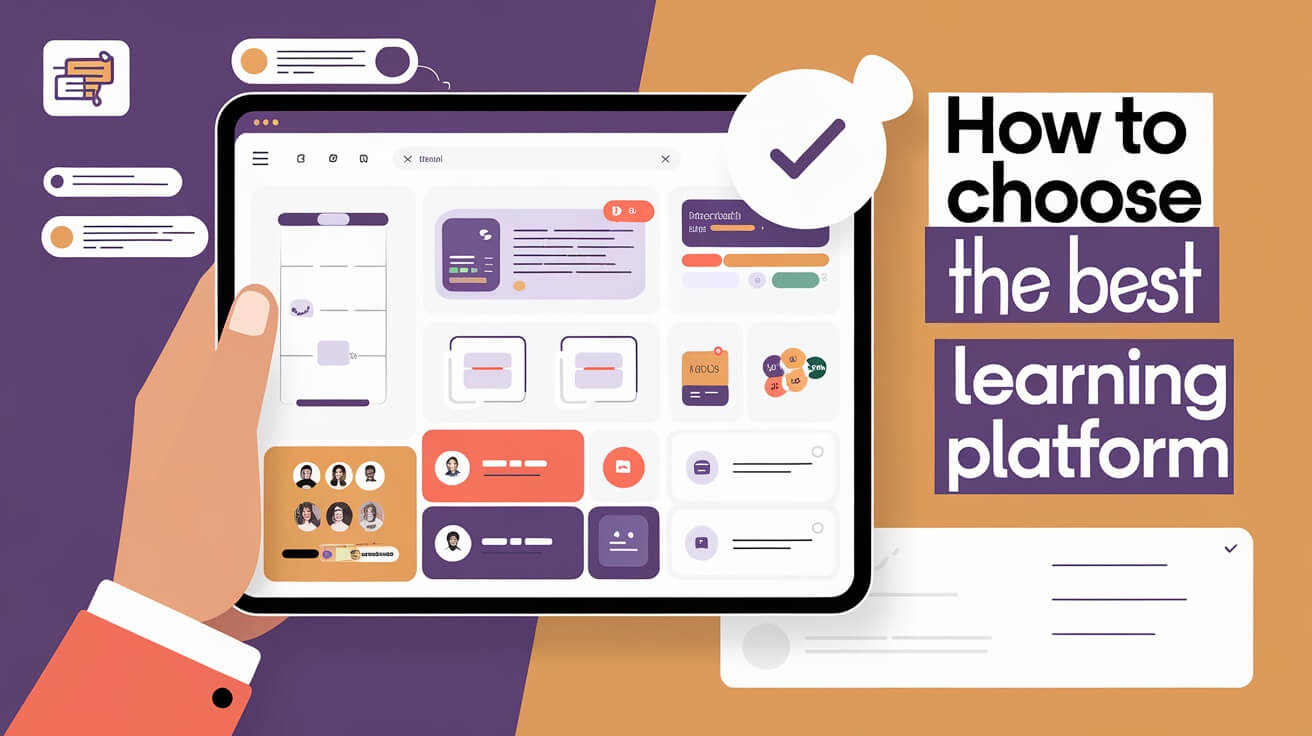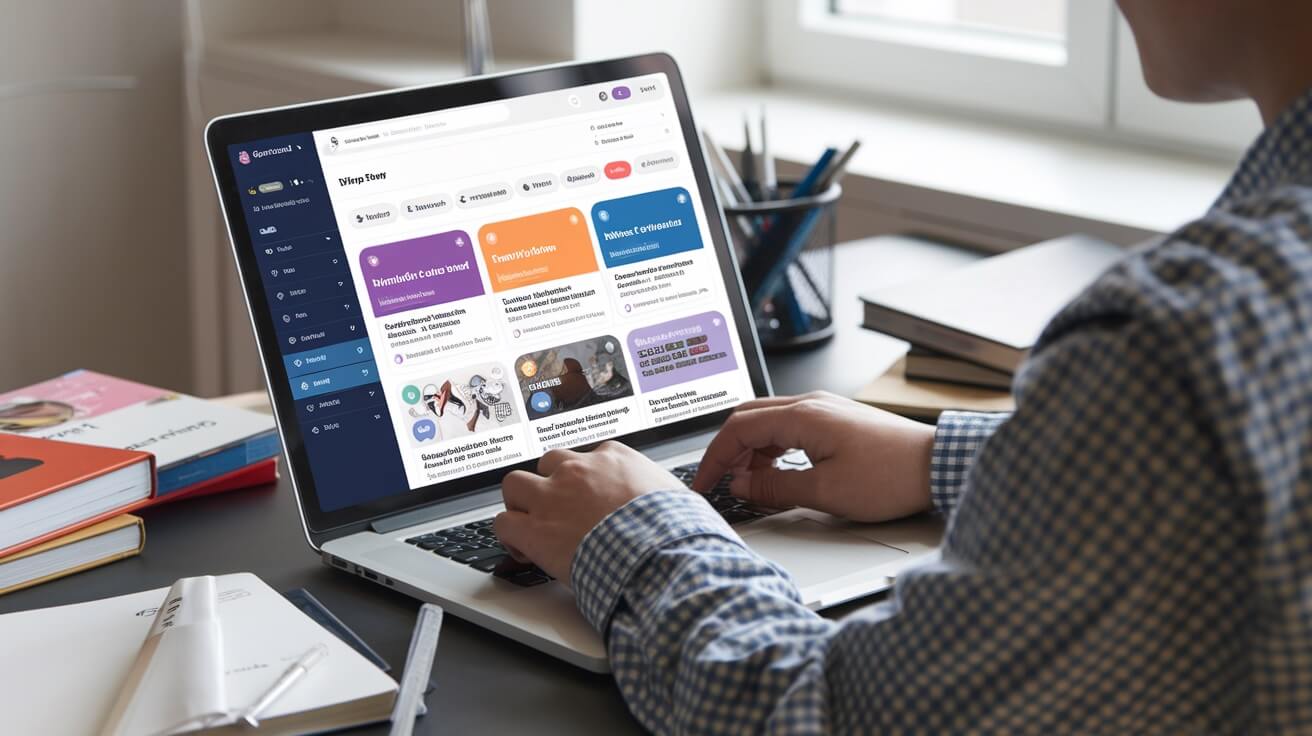
Have you ever been overwhelmed while searching for the perfect digital learning platform? Many of us face this challenge. With so many options promising to transform our learning, how do you pick the one that's genuinely right for you? Whether studying for exams, advancing your career, or exploring a new interest, selecting the right learning platform can significantly impact your success.
Let's be honest: it's about more than finding a platform with the best reviews or the most courses. It's about finding one that aligns with your goals, your pace, and how you like to learn. In this guide, we'll walk you through everything you need to know to make a confident decision. By the end, you'll feel confident choosing the platform that suits your needs perfectly.
Understanding Digital Learning Platforms
What Is a Digital Learning Platform?
At its core, a digital learning platform is an online space that brings learning to your fingertips. Whether mastering coding, exploring new languages, or developing creative hobbies, these platforms make education accessible anytime, anywhere.
Take Coursera, for example. It partners with universities like Yale and Stanford to offer courses you'd traditionally find in a classroom. Or consider Udemy, which focuses on practical skills, making it ideal for hands-on learners. Meanwhile, Khan Academy offers free, bite-sized lessons perfect for school students or anyone looking for foundational knowledge.
Why Digital Learning Platforms?

Digital learning platforms have revolutionized education by making high-quality learning accessible to everyone. Whether you're a student, professional, or lifelong learner, these platforms offer the flexibility to learn anytime and anywhere that works for you.
They provide diverse courses, from academic subjects to practical skills, often at a fraction of the cost of traditional education. With features like interactive lessons, expert instructors, and recognized certifications, digital learning bridges the gap between ambition and opportunity. By catering to individual needs and preferences, these platforms empower learners to achieve their goals efficiently, making education more inclusive and adaptable to modern lifestyles.
Types of Digital Learning Platforms
Not all platforms are created equal. Here are a few types to consider:
-
MOOCs (Massive Open Online Courses): Think Coursera or edX, which provide structured courses from top universities.
-
Skill-Based Platforms: Platforms like Udemy and Skillshare focus on practical, skill-building content like photography or graphic design.
-
Corporate Learning Tools: LinkedIn Learning is tailored for professionals aiming to enhance their workplace skills.
-
Learning Management Systems (LMS): In educational institutions, Blackboard and Moodle are popular tools for managing course content and tracking progress.
Benefits of Digital Learning
Why are digital platforms such a game-changer?
-
Flexibility: You can learn anytime, anywhere—no need to stick to a strict schedule.
-
Affordable Access: Many platforms are far cheaper than traditional classroom settings, with some offering free courses.
-
Expert Content: Learn directly from industry leaders, professors, and practitioners.
-
Diverse Offerings: Whether it's coding, cooking, or creative writing, there's something for everyone.
Key Features to Consider
1. Usability and Accessibility
No one wants to waste valuable time figuring out how to use a platform. A good platform should feel intuitive, whether you're tech-savvy or not. It should work seamlessly across devices, allowing you to switch between your laptop and phone without losing progress.
Example:
Platforms like Coursera make it easy to resume lessons across devices so that you can learn at home or on the go.
2. Course Variety and Quality
Do you prefer detailed academic lessons or quick, skill-based tutorials? Make sure the platform offers what you're looking for. Check previews or sample lessons to gauge the quality of the content.
Tip:
Platforms like Udemy allow users to see ratings and reviews for each course, helping you pick wisely.
3. Certification and Accreditation
If you're learning for career purposes, choose platforms that provide certifications employers recognize. Some even offer pathways to degrees.
Example:
edX and Coursera offer certificates that carry actual weight in the job market.
4. Customization and Scalability
The ability to customize content or scale learning to a group's needs is critical for organizations or educators. Platforms like Moodle allow full customization, making them popular for institutional use.
5. Pricing Models and Affordability
While some platforms charge per course (like Udemy), others use subscription models (like Coursera Plus). Free platforms like Khan Academy are great for learners on a budget.
Tip:
Look for discounts or free trials before committing. Many platforms offer significant savings during promotions.
Challenges in Choosing the Right Platform
Let's not sugarcoat it: picking the right platform can feel daunting.
-
Too Many Choices: With hundreds of platforms, it's easy to feel paralyzed.
-
Technical Barriers: Slow internet or outdated devices can limit access to some platforms.
-
Inconsistent Quality: Only some courses on a platform are created equal, especially on open marketplaces like Udemy.
The key is to align your needs with the platform's offerings and take advantage of reviews and trial options.
Comparing Popular Platforms
Here’s a quick snapshot of some leading options:
| Platform | Pros | Cons |
|---|---|---|
| Coursera | University-level courses, certifications | Subscription costs can be high |
| Udemy | Affordable, pay-per-course model | Quality depends on the instructor |
| Khan Academy | Free, ideal for beginners | Limited advanced or specialized topics |
Expert Tips for Selecting the Right Platform
-
Clarify Your Goals: Are you learning for fun, career growth, or a school project? Identifying your goal will narrow your options.
-
Read Reviews and Ratings: Platforms like Trustpilot or Reddit are great for honest user reviews.
-
Test the Platform: Many platforms, like LinkedIn Learning, offer free trials. Use these to explore courses and features.
-
Focus on Must-Have Features: Whether it's certification, interactive lessons, or mobile compatibility, prioritize what matters most to you.
-
Keep Your Budget in Mind: Free platforms are excellent for general learning, but paid platforms often offer more specialized and advanced courses.
Future Trends in Digital Learning
Online learning is advancing quickly, with new trends transforming how we gain knowledge. These innovations aim to make education more tailored, interactive, and accessible to learners from all walks of life.
1. AI-Driven Personalization
Artificial Intelligence (AI) transforms digital learning by tailoring content to individual needs. Imagine a platform that understands your learning pace, strengths, and areas for improvement and then adjusts lessons accordingly. AI-powered tools can recommend specific courses, provide instant feedback, and even create customized study plans. This personalized approach enhances learning outcomes, ensuring learners get what they need to succeed. For example, adaptive platforms like Coursera and edX use AI to adjust course difficulty and content flow based on user performance.
2. Gamification
Learning doesn't have to be monotonous, and gamification is proof of that. By incorporating game-like elements such as points, rewards, badges, and leaderboards, platforms like Duolingo make learning fun and addictive. These features motivate and engage learners, transforming education into an interactive experience. Gamification works particularly well for skills that require consistent practice, such as language learning or math.
3. Microlearning
In today's fast-paced world, bite-sized lessons are becoming increasingly popular. Known as microlearning, this trend caters to busy professionals who want to learn on the go. These short, focused lessons—often no longer than 5-10 minutes—allow learners to absorb information quickly and effectively. Platforms like LinkedIn Learning and Skillshare are integrating microlearning modules, making it easier for users to achieve their goals without overwhelming their schedules.
FAQs
1. How do I choose between free and paid platforms?
Choosing between free and paid platforms depends on your learning goals and budget. Free platforms like Khan Academy are excellent for exploring new topics or brushing up on foundational knowledge without financial commitment. However, if you seek advanced courses, professional certifications, or in-depth learning experiences, paid platforms like Coursera or Udemy provide more excellent value. Paid options often include expert-led courses, project-based learning, and recognized certifications that can boost your resume. Evaluate your priorities—cost, content depth, or credentials—and pick accordingly.
2. Can I get a job with an online certification?
Employers widely accept online certifications from reputable platforms like Coursera and edX. Many courses on these platforms are designed in collaboration with universities and industry leaders, ensuring the content meets professional standards. Certifications can showcase your skills, demonstrate your commitment to learning, and even help you transition into new fields. While some roles require formal degrees, online certifications are increasingly recognized as a credible way to prove expertise and stay competitive in the job market.
3. What if I don't like the platform I choose?
Most platforms understand that learning preferences vary and offer refunds or free trials to mitigate this concern. For instance, Udemy has a 30-day money-back guarantee for courses, while LinkedIn Learning provides a free trial to explore its content. Before committing, review the platform's refund or cancellation policy and use free trials to test its usability and course quality. This approach helps you confirm that the platform meets your learning needs without worrying about wasting money.
4. Are digital learning platforms beginner-friendly?
Absolutely! Platforms like Khan Academy and Skillshare are specifically designed to cater to beginners. They provide easy-to-understand content, user-friendly interfaces, and step-by-step guidance to help new learners build confidence. Khan Academy, for example, offers foundational lessons in subjects like math and science, while Skillshare focuses on creative and skill-based learning. Most platforms also allow you to start at your level and progress at your own pace, ensuring that even those new to digital learning feel supported and engaged.
Conclusion
Choosing the best digital learning platform can feel manageable. By understanding your goals, evaluating the key features, and exploring trial options, you'll find a platform that fits your needs perfectly.
Remember, the right platform isn't just a tool—it's an investment in your growth. Take your time, weigh your options, and get started today. Your learning journey awaits!
Online Learning Digital Learning

